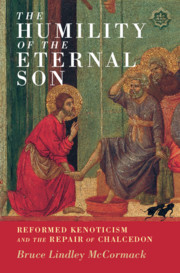Book contents
- The Humility of the Eternal Son
- Current Issues in Theology
- The Humility of the Eternal Son
- Copyright page
- Dedication
- Dedication
- Contents
- Acknowledgments
- Prologue to a Trilogy of Works
- Introduction
- Part I A Critical History of Kenotic Christologies and Their Antecedents:
- Part II Returning to Scripture
- Part III Repairing Chalcedon
- 7 Towards a Reformed Version of Kenotic Christology
- Epilogue
- Select Bibliography
- Names Index
- Concepts Index
7 - Towards a Reformed Version of Kenotic Christology
from Part III - Repairing Chalcedon
Published online by Cambridge University Press: 19 November 2021
- The Humility of the Eternal Son
- Current Issues in Theology
- The Humility of the Eternal Son
- Copyright page
- Dedication
- Dedication
- Contents
- Acknowledgments
- Prologue to a Trilogy of Works
- Introduction
- Part I A Critical History of Kenotic Christologies and Their Antecedents:
- Part II Returning to Scripture
- Part III Repairing Chalcedon
- 7 Towards a Reformed Version of Kenotic Christology
- Epilogue
- Select Bibliography
- Names Index
- Concepts Index
Summary
This chapter develops a Reformed version of kenotic Christology. In the place of two discreet (substantially conceived) “natures” subsisting in one and the same “person,” this chapter posits the existence of a single composite hypostasis, constituted in time by means of what it calls the “ontological receptivity” of the eternal Son to the “act of being” proper to the human Jesus as human. It is the Son’s “ontological receptivity” that makes an eternal act of “identification” on the part of the Logos with the human Jesus to be constitutive of his identity as the second “person” of the Trinity even before the actual uniting occurs. What emerges is in the spirit of Chalcedon even if it is not according to the letter. This chapter develops this Christology, shows how it follows the spirit of Chalcedon, and defends it against possible objections.
Keywords
- Type
- Chapter
- Information
- The Humility of the Eternal SonReformed Kenoticism and the Repair of Chalcedon, pp. 249 - 294Publisher: Cambridge University PressPrint publication year: 2021

